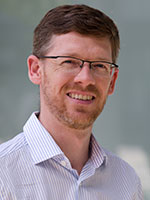Dr. Mark Brockman
From the Ground Up
Associate Professor, Simon Fraser University

Dr. Mark Brockman, Canada Research Chair and Associate Professor at Simon Fraser University, is a basic science researcher who specializes in viral pathogenicity of HIV and the human immune response to HIV infection. Though his graduate studies centred on herpes virus in mouse models, when he had the opportunity to move into HIV as a postdoctoral fellow he jumped at the chance. “I was attracted to working with a human infection that was at the top of the news,” says Dr. Brockman. “I think the basic HIV research we do in the lab is building and moving in the direction of being more clinically relevant. It’s really a driver for us, thinking that others are working on translating and applying what we know.”
Currently, Dr. Brockman has several collaborative projects on the go. Funded through the Canadian HIV Vaccine Initiative, one such project follows a group of adolescents and young adults in Soweto and Durban, South Africa. “We are using multidisciplinary approaches to assess risk factors associated with HIV infection and other sexual transmitted infections,” explains Dr. Brockman. “The goal is to get a better idea of what is happening on the ground with individuals.” With a current enrollment of more than 200 participants, the project is jointly led by Dr. Angela Kaida and Dr. Jeremy Snyder at Simon Fraser along with collaborators from South Africa. So far, researchers have found some surprising results, including a very high prevalence of undiagnosed and untreated STIs in the participant group. “The way that South Africa deals with STIs is usually through a syndromic approach—people come to the clinic complaining of symptoms, and they get checked out and treated,” explains Dr. Brockman. “However, there is relatively little molecular or clinical diagnostics in the assessment. Our results have really opened our eyes about this underlying problem with undiagnosed STIs in South African adolescents and young adults.”
It’s a project that is working on the fundamentals—building collaborations and understanding from the ground up. “The project is providing me with some unique opportunities to work with social scientists, epidemiologists and clinical scientists on the ground in South Africa,” says Dr. Brockman. “We are putting together an effective multinational group of researchers who can really set the foundation, and determine the big behavioural, biomedical and clinical challenge. We can then begin to tackle those issues.”
In a project closer to home, Dr. Brockman is involved in the Canadian HIV Cure Initiative led by Dr. Eric Cohen in Montreal. The Brockman lab is characterizing genetic sequences of latent viral reservoirs to understand how they evolve within a patient. “What we are seeing in latency, particularly in people who went on ART relatively late in their chronic infection, is that their latent reservoir is full of viruses that have evaded the T cell response already,” says Dr. Brockman. “We’re trying to assess how the genotypes of these latent viruses might affect our ability to eradicate them.” The lab work is done in partnership with Dr. Zabrina Brumme at the HIV/AIDS Molecular Epidemiology Lab at Simon Fraser and Dr. Art Poon at the BC Centre for Excellence in HIV/AIDS at St Paul’s Hospital. Viral latency represents a big challenge to a cure for HIV infection, “We’ll have to figure out a way to target those cells that have probably escaped from the most effective T-cells in the patient. Though eliminating latent viruses is a very long term goal, we are learning quite a bit about the biology of the virus and how the immune system is recognizing and responding to it,” says Dr. Brockman.
As a basic scientist, multidisciplinary work has been a learning experience for Dr. Brockman. “People from different disciplines can be using the same words, but have different meanings.” He’s got some good advice for collaborative researchers: “It’s really helpful and in fact essential that collaborations are built upon personal interactions and personal friendships. It’s much easier to deal with challenges if you are building something out of a friendship.” You really do get by with a little help from your friends.
The Canadian Association for HIV Research (CAHR), the CIHR HIV/AIDS Research Initiative, the Canadian Foundation for AIDS Research (CANFAR), the CIHR Canadian HIV Trials Network (CTN) and the Canadian HIV Vaccine Initiative (CHVI) Research and Development Alliance Coordinating Office (ACO) would like to thank Dr. Brockman for his significant contributions to our understanding of HIV. His work is part of a larger Canadian research effort that is making a difference in the lives of those affected by HIV in Canada and around the world.
- Date modified: